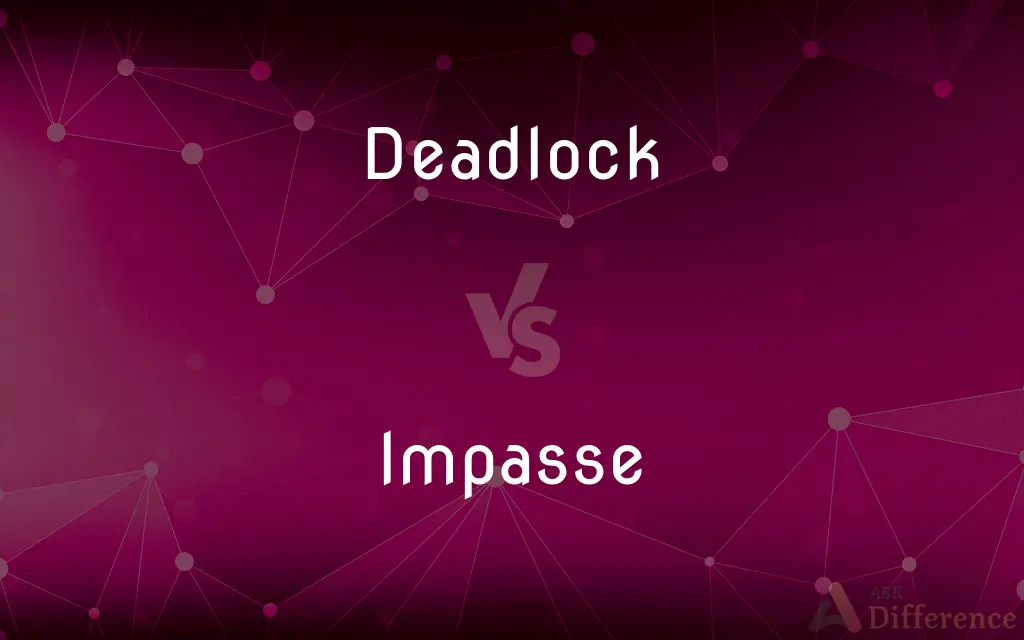Deadlock vs. Impasse — What's the Difference?

Difference Between Deadlock and Impasse
ADVERTISEMENT
Compare with Definitions
Deadlock
In concurrent computing, a deadlock is a state in which each member of a group waits for another member, including itself, to take action, such as sending a message or more commonly releasing a lock. Deadlocks are a common problem in multiprocessing systems, parallel computing, and distributed systems, where software and hardware locks are used to arbitrate shared resources and implement process synchronization.In an operating system, a deadlock occurs when a process or thread enters a waiting state because a requested system resource is held by another waiting process, which in turn is waiting for another resource held by another waiting process.
Impasse
A bargaining impasse occurs when the two sides negotiating an agreement are unable to reach an agreement and become deadlocked. An impasse is almost invariably mutually harmful, either as a result of direct action which may be taken such as a strike in employment negotiation or sanctions/military action in international relations, or simply due to the resulting delay in negotiating a mutually beneficial agreement.
Deadlock
A standstill resulting from the opposition of two unrelenting forces or factions.
Impasse
A road or passage having no exit; a cul-de-sac.
Deadlock
(Sports) A tied score.
ADVERTISEMENT
Impasse
A situation that is so difficult that no progress can be made; a deadlock or a stalemate
Reached an impasse in the negotiations.
Deadlock
(Computers) A failure or inability to proceed due to two programs or devices both requiring a response from the other before completing an operation.
Impasse
A road with no exit; a cul-de-sac.
Deadlock
Chiefly British A deadbolt.
Impasse
(figurative) A deadlock or stalemate situation in which no progress can be made.
Deadlock
To bring or come to a deadlock.
Impasse
An impassable road or way; a blind alley; cul-de-sac; fig., a position or predicament affording no escape.
The issue from the present impasse will, in all probability, proceed from below, not from above.
Deadlock
A standstill resulting from the opposition of two evenly matched forces; a stalemate or impasse.
The negotiation ended in deadlock, with neither party willing to compromise on the price.
Impasse
A situation in which no progress can be made or no advancement is possible;
Reached an impasse on the negotiations
Deadlock
(computing) An inability to continue due to two programs or devices each requiring a response from the other before completing an operation.
Impasse
A street with only one way in or out
Deadlock
(intransitive) To cause or come to a deadlock.
Deadlock
A lock which is not self-latching, but requires a key to throw the bolt forward.
Deadlock
A counteraction of things, which produces an entire stoppage; a complete obstruction of action.
Things are at a deadlock.
The Board is much more likely to be at a deadlock of two to two.
Deadlock
A situation in which no progress can be made or no advancement is possible;
Reached an impasse on the negotiations
Share Your Discovery

Previous Comparison
After vs. Thereafter
Next Comparison
Warm vs. Cozy













































